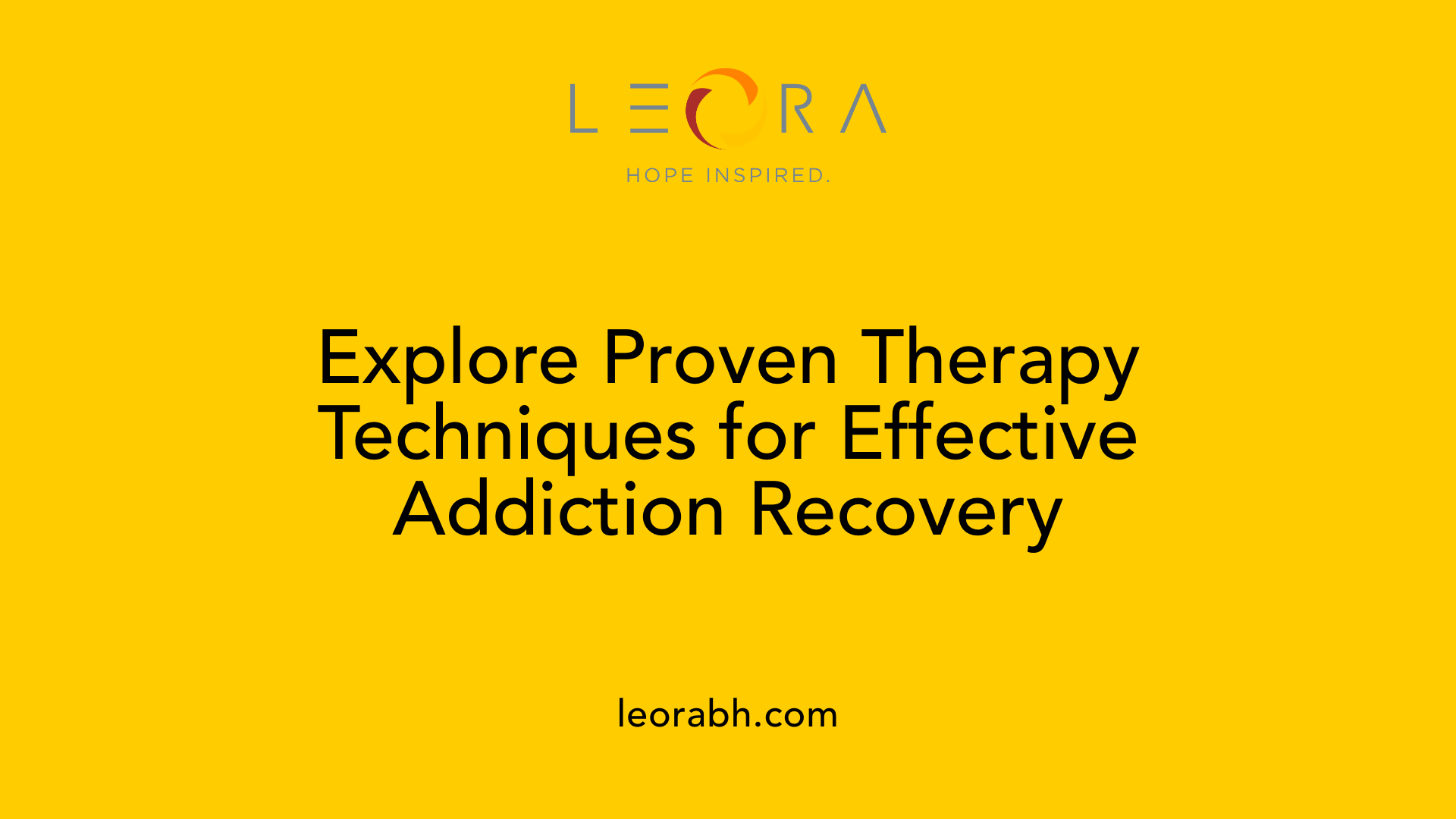Therapy Techniques That Support Lasting Addiction Recovery
Building Foundations for Long-Term Sobriety
Understanding the Core of Addiction Therapy
Achieving lasting sobriety requires more than just initial treatment; it demands a comprehensive approach that combines evidence-based therapies, medication, ongoing support, and personalized relapse prevention strategies. This article explores the most effective therapy techniques that contribute to enduring recovery from addiction, emphasizing their roles in addressing root causes, fostering emotional resilience, and preventing relapse.
Variety of Evidence-Based Therapy Techniques in Addiction Recovery

What are the techniques for addiction therapy?
Addiction therapy incorporates a diverse array of evidence-based approaches designed to support individuals through recovery. These techniques are tailored to address the psychological, emotional, and behavioral aspects of addiction.
One of the most prominent forms is behavioral therapy, particularly cognitive-behavioral therapy (CBT), which helps individuals identify and challenge negative thought patterns that lead to substance use. CBT also teaches coping skills to manage stress, cravings, and triggers, significantly reducing relapse risk. Similarly, dialectical behavior therapy (DBT) emphasizes emotional regulation, distress tolerance, and interpersonal effectiveness, helping clients handle intense emotions without turning to substances.
Motivational interviewing (MI) is another vital technique. It is a goal-oriented counseling method that encourages individuals to explore and resolve ambivalent feelings about change. MI effectively increases motivation and commitment, especially in resistant or unmotivated patients.
Addressing trauma-related roots of addiction is essential, and therapies like Eye Movement Desensitization and Reprocessing (EMDR) are used to process traumatic memories, alleviating emotional distress and lowering the likelihood of relapse.
Holistic practices play a supportive role alongside traditional therapies. Mindfulness and meditation techniques enhance present-moment awareness, reduce stress, and improve emotional regulation. Practices like yoga and deep-breathing exercises are integrated into treatment plans to foster relaxation and resilience.
Pharmacological support, known as medication-assisted treatment (MAT), complements behavioral therapies. Medications such as methadone, buprenorphine, naltrexone, Acamprosate, and Disulfiram help to manage withdrawal symptoms, diminish cravings, and prevent relapse.
Most comprehensive programs combine these approaches into personalized treatment plans. By integrating therapy modalities, medication, ongoing support, and addressing the individual's unique needs, professionals aim to promote sustained recovery and improve long-term outcomes.
| Therapy Type | Purpose | Examples | Additional Notes |
|---|---|---|---|
| Behavioral Therapy | Modify thoughts and behaviors | CBT, DBT | Focus on coping skills and emotional regulation |
| Motivational Interviewing | Increase motivation for change | MI | Empathetic, non-confrontational approach |
| Trauma-Informed Therapy | Address traumatic roots of addiction | EMDR, Brainspotting | Helps process traumatic memories and reduce emotional distress |
| Holistic Practices | Promote emotional well-being | Mindfulness, yoga, meditation | Enhance stress management and emotional resilience |
| Medication-Assisted Treatment | Manage withdrawal and cravings | Methadone, Naltrexone, Disulfiram | Often combined with therapy for best outcomes |
To learn more about these approaches, the search term "evidence-based addiction therapy techniques" provides extensive research and implementation strategies.
Most Effective Treatment Approaches for Long-Term Recovery

What treatment approach is most effective for addiction recovery?
The most successful strategies for addiction recovery involve a comprehensive, multifaceted approach tailored to each individual. This method combines evidence-based psychological therapies, medications, and ongoing support systems.
Cognitive-Behavioral Therapy (CBT) is widely regarded as an effective treatment. It helps individuals recognize and change negative thought patterns that lead to substance use, while teaching healthier coping skills to manage stress, trauma, and triggers. CBT has shown that around 60% of participants maintain recovery for at least a year post-treatment.
Motivational Interviewing (MI) plays a crucial role in boosting motivation to change behavior. Especially useful for those resistant or unmotivated to seek help, MI employs an empathetic, goal-oriented style to encourage active participation in the recovery process.
Medication-Assisted Treatment (MAT) is recommended when appropriate, especially for opioid addiction. Medications like methadone, buprenorphine, naltrexone, and acamprosate help detoxify the body, reduce cravings, and prevent relapse. Combining these with behavioral therapies significantly improves long-term outcomes.
Beyond individual therapies, involving family through family therapy fosters healthier relationships and improves communication, addressing familial dynamics that influence recovery.
Relapse prevention strategies, including coping skills training, planning, and managing triggers, are integral. These are often reinforced through ongoing therapy, support groups, and community resources.
Participation in mutual aid groups such as Alcoholics Anonymous or Narcotics Anonymous provides peer support, shared experiences, and accountability, which are vital for sustaining sobriety.
A personalized treatment plan considers the person's medical, psychological, social, and legal needs. Regular assessments allow adjustments to treatment modalities, ensuring the approach remains effective.
When behavioral therapies, medication, and support systems are combined in a tailored manner, individuals experience higher rates of sustained sobriety and a better quality of life.
| Treatment Components | Description | Effectiveness | Additional Notes |
|---|---|---|---|
| Cognitive-Behavioral Therapy | Recognizes and alters harmful thought patterns, develops coping skills | 60% sobriety at 1 year | Core therapy used in addiction recovery |
| Motivational Interviewing | Boosts motivation for change | Increases treatment engagement | Empathetic, goal-oriented style |
| Medication-Assisted Treatment | Manages cravings, detoxifies | Reduces relapse risk | Used alongside therapies |
| Family Therapy | Improves family communication | Supports relational stability | Addresses family dynamics |
| Mutual Support Groups | Peer support, accountability | Maintains long-term sobriety | Examples include AA, NA |
Ultimately, integrating these elements—psychological, behavioral, medical, and social—into a personalized plan offers the best chance for lasting recovery.
Maintaining Long-Term Recovery Through Lifestyle and Support Systems

How do you maintain long-term recovery?
Sustaining sobriety after initial treatment involves a multifaceted approach focused on lifestyle, emotional resilience, and community support. Adopting healthy daily habits, such as regular exercise, eating a balanced diet, and ensuring adequate sleep, promotes physical well-being and emotional stability. Incorporating relaxation practices like yoga, meditation, or deep-breathing exercises can help manage stress and reduce cravings.
Building a strong support network is essential. Participating in peer support groups like Alcoholics Anonymous (AA) or Narcotics Anonymous (NA), engaging in ongoing counseling, and connecting with community resources provide ongoing encouragement and accountability.
Developing and practicing effective coping strategies further strengthens recovery. These include stress management techniques, assertive communication, and emotional regulation skills. Establishing a personalized relapse prevention plan—identifying triggers and early warning signs—enables individuals to respond swiftly and effectively to potential setbacks.
Ongoing self-awareness and goal setting help maintain focus and motivation. Regularly reviewing personal progress, adjusting goals, and seeking help when facing challenges foster resilience. In essence, long-term recovery is maintained through a combination of healthy habits, a robust support system, self-awareness, and proactive planning to navigate life's stresses and avoid relapse.
Relapse Prevention Strategies and Techniques

What are the strategies for addiction recovery?
Effective relapse prevention begins with a comprehensive approach that includes professional assistance, ongoing support, and personal commitment. Engaging in therapy—such as cognitive-behavioral therapy (CBT)—helps individuals identify and manage triggers that may lead to substance use. Building a strong support network, including support groups like Alcoholics Anonymous (AA), provides emotional reinforcement and accountability.
Practicing healthy coping strategies is crucial. This can include mindfulness meditation, relaxation exercises, engaging in meaningful activities, and maintaining a balanced lifestyle with proper nutrition, exercise, and adequate sleep. Setting realistic goals helps individuals stay motivated and focused on their recovery journey.
Living a healthy life also involves avoiding high-risk situations and triggers, such as stressful environments or places associated with past substance use. Developing personalized relapse prevention plans tailored to one’s unique triggers, emotional states, and environmental factors enhances long-term sobriety.
Ongoing participation in aftercare programs, continued therapy, and self-monitoring are vital. These elements support emotional resilience, address underlying issues, and help individuals adapt to life without substances, reducing the likelihood of relapse and promoting sustained recovery.
The Role of Therapy in Addressing Root Causes of Addiction

How do therapy techniques contribute to addressing root causes of addiction?
Therapy plays a vital role in uncovering and resolving the underlying issues that often lead to addiction. Techniques such as trauma-informed care, Eye Movement Desensitization and Reprocessing (EMDR), and psychodynamic therapy help individuals identify and work through traumatic experiences, mental health conditions, and emotional distress.
Trauma-focused therapies, including EMDR and Brainspotting, enable clients to process past trauma that may contribute to substance use as a form of self-medication. Psychodynamic approaches explore unconscious thoughts and unresolved conflicts rooted in early experiences, providing deeper insight into behavioral patterns.
By addressing these foundational problems, therapy helps individuals develop healthier emotional responses and coping mechanisms. This targeted work can break the cycle of addiction driven by unresolved trauma or mental health struggles.
Long-term stability is enhanced because therapy doesn’t just treat immediate symptoms but seeks to resolve core issues that sustain addictive behaviors. As a result, individuals are better equipped to manage stress, emotional triggers, and mental health challenges, reducing the risk of relapse.
Integrated therapy approaches foster resilience and emotional regulation, paving the way for sustained recovery beyond the initial treatment phase.
Holistic and Alternative Methods Supporting Recovery
What are holistic and alternative therapy methods supporting sustained sobriety?
Holistic and alternative therapies play a vital role in supporting individuals on their recovery journey. Techniques like mindfulness, yoga, acupuncture, art therapy, and experiential therapies offer additional tools to reduce stress, manage cravings, and express emotions effectively.
Mindfulness practices, such as meditation and deep breathing exercises, help individuals stay present and aware of their thoughts and feelings. This awareness can lead to better emotional regulation and decreased relapse risk. Yoga, combining physical postures and breathing techniques, fosters mindfulness while improving physical health and emotional stability.
Acupuncture and other complementary therapies are used to alleviate withdrawal symptoms and promote relaxation. These methods support mental well-being by balancing the body's energy systems and reducing stress.
Art and experiential therapies, including music therapy, creative arts, and adventure-based activities, provide spaces for emotional expression and healing. Such therapies help individuals explore feelings, process trauma, and develop new skills in a non-verbal, engaging manner.
These holistic approaches do not replace traditional treatments like medication or therapy but work alongside them to enhance overall well-being. They help build resilience, improve mental health, and foster a balanced lifestyle, which are crucial for maintaining sobriety over the long term.
Research supports the effectiveness of these approaches; for example, mindfulness-based interventions have shown a 35% reduction in relapse rates.
Overall, integrating holistic therapies into addiction recovery programs creates a comprehensive support system that addresses physical, emotional, and spiritual health — essential components for lasting sobriety.
For further information, explore "holistic addiction therapies and alternatives" to discover more about these supportive practices.
Supporting Lasting Sobriety Through Comprehensive Treatment
Long-term addiction recovery is a multifaceted process that benefits from a combination of evidence-based therapies, medication, lifestyle changes, and ongoing support. Therapeutic techniques such as CBT, DBT, trauma-focused interventions, and holistic practices provide tools to understand and address the root causes of addiction, develop emotional resilience, and prevent relapse. Personalized, integrated treatment plans combined with community involvement and self-care strategies create a robust foundation for lasting sobriety. By embracing the full spectrum of therapeutic options and maintaining vigilance through relapse prevention, individuals can achieve a healthier, more stable, and fulfilling life in recovery.
References
- Treatment and Recovery | National Institute on Drug Abuse (NIDA)
- Best Therapies for Treating Drug Addiction
- CBT for Addiction: A Key to Lasting Change | RACNJ
- Useful CBT Techniques for Recovery | Benefits of Mental Health
- How Substance Use Counseling Builds Long-Term Coping Skills ...
- Addiction Treatment Methods | Evidence-Based Practices
- Chapter 5—Specialized Substance Abuse Treatment Programs - NCBI
- Active vs. Passive Addiction Recovery Techniques
Find Your Inner Light
Related Articles
Schedule an Assessment
Leora Behavioral Health provides comprehensive treatment services, including ambulatory detox, mental health IOP, and SUD IOP, to support your journey toward lasting recovery.
Our caring team will guide you through the admissions process and create a personalized treatment plan tailored to your unique needs. We welcome walk-ins. If you or a loved one is struggling, reach out today. We’re here to help.


.svg)




.svg)
.svg)
.svg)
.svg)
